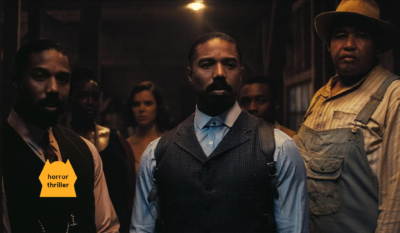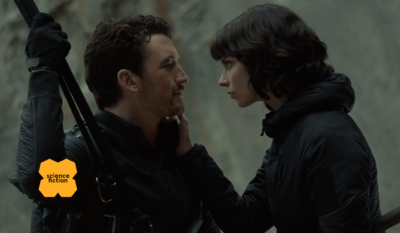Crossing follows a retired schoolteacher who enlists the help of a young 20-something to find her trans niece who disappeared years ago.


Crossing is a sweet, sensitive and effortlessly charming found family drama that follows three vastly different people as the grapple with the truths of their pasts, presents and futures. In just 105 minutes, writer-director Levan Akin so firmly wins you over that you'll miss the characters as soon as it cuts to black. Filled with joy (particularly queer joy) amongst the realities of the world, Crossing is a beautiful and moving testament to change and one of the best movies of the year.
Crossing will be released in select theaters on July 19. It will stream worldwide on MUBI on August 30.

In the final scenes of Crossing, the new film from Georgian director Levan Akin, we say goodbye to each of the three characters we've been following over the course of a fateful week. One by one, we watch them step into an uncertain but hopeful future. And yet my heart ached. Not for the trio, they find themselves in a better place than we found them having been profoundly changed by the events of the film. Rather I was going to miss spending time with them in their world, like when your favorite TV show airs for the final time. It's an impressive feat for 105 minutes but a testament to Akin's ability to pour empathy through the screen—a reason it is one of the best films of the year.
ADVERTISEMENT
While we spend equal time with each of the three characters the story begins with Lia (Mzia Arabuli), a retired school teacher who we meet on a mission to find her trans niece Tekla as a promise to her dying sister. On that journey, she quickly meets Achi (Lucas Kankava), a quick-tongued 20-something living on the outskirts of the Georgian capital Batumi with his less-than-agreeable older brother (“put a shirt on around my wife,” he nags). When he meets Lia, she sees her as his way out, which is convenient as he says he knew her niece and where she lives in Istanbul just across the Turkish border.
There's an easy charm between Arabuli's old curmudgeon Lia and Kankava's young eager Achi—not unlike Paul Giamatti and Dominic Sessa recently in The Holdovers—as it turns into a road trip movie complete with quippy banter and unexpected snafus—like when Achi books them into a seedy hostel, much to Lia's dismay. Their search for Tekla hits a dead end when the people in the apartment complex where Achi believes she lived, which is tucked in a rundown neighborhood where much of the city's LGBTQ+ community resides, don't recognize her name.

ADVERTISEMENT
Left to wander and search an unfamiliar city, Lia and Achi find themselves on separate journeys of discovery—Lia, an older woman of the past reckoning with a newfound present, and Achi, a boy of the present looking for a future. However, there's a third variation of this journey. Intercut with Lia and Achi's story is trans NGO lawyer Evrim's (Deniz Dumanlı). Her journey is one of a woman of the future living in the present. As we follow her day-to-day interacting with friends, going on a date with a handsome taxi driver and trying to change her gender to female on her government documents (“you have to get this form signed by every department in the building,” a clerk tells her, which she happily does despite its ridiculousness) we get a deeper understanding of her way of life—and that of many queer people in Turkey.
And while it doesn't shy away from the hard truths of being queer in a country where LGBTQ rights are actively diminished, Akin lets Evrim experience her life with joy and triumph—even if it has to be done largely in the shadows. Dumanli breezes through each scene with lived-in confidence that feels like safety for the audience. It puts Lia and Achi's own turbulent journeys into perspective although they get to experience their moments of joy too.
As Achi wanders the streets of Istanbul looking for work—and a way to stay in the country—he encounters a group of young people who show him companionship and kindness—and more importantly help feed his seemingly endless appetite. Lia encounters moments that remind of her past and the free woman she used to be. On one night, where she leans too heavily on her alcohol vice that we see throughout the movie, she recounts how she used to be the best dancer in her village before twirling in the street amongst the crowd. Where she usually has a scowl we finally see a smile and Achi understands her just a bit more. It seems understanding is Akin's goal with the entire movie.
ADVERTISEMENT
It's the small moments of intimacy that bring Crossing to greatness like Achi bringing Lia a pastry after he disappeared for a night, Lia dancing in the street with a group of strangers or Evrim bringing a small local boy to get his haircut. They're small gestures that speak to the movie's humanity.
In many ways, Crossing falls into the familiar “chosen family” dramedy genre with movies like Short Term 12 or Hirokazu Kore-eda's brilliant Shoplifters. Each character's effortless charm wins you over while their stories move you with profound emotion. At the end, Lia finds Tekla, but perhaps not in the way that you'd expect. It's in those stunning final scenes that you realize Akin has deep knowledge of the story he's telling and the redemption that his characters are after.
ADVERTISEMENT
More movies, less problems
- Jordan Peele Unleashes the First Trailer for ‘HIM'
- ‘Sinners' is the best movie of the year | movie review
- Romantic sci-fi thriller ‘The Gorge' hits its mark | movie reivew
Hey! I'm Karl. You can find me on Twitter and Letterboxd. I'm also a Tomatometer-approved critic.
💌 Sign up for our weekly email newsletter with movie recommendations available to stream.
ADVERTISEMENT
Hey, I'm Karl, founder and film critic at Smash Cut. I started Smash Cut in 2014 to share my love of movies and give a perspective I haven't yet seen represented. I'm also an editor at The New York Times, a Rotten Tomatoes-approved critic, and a member of the Online Film Critics Society.

